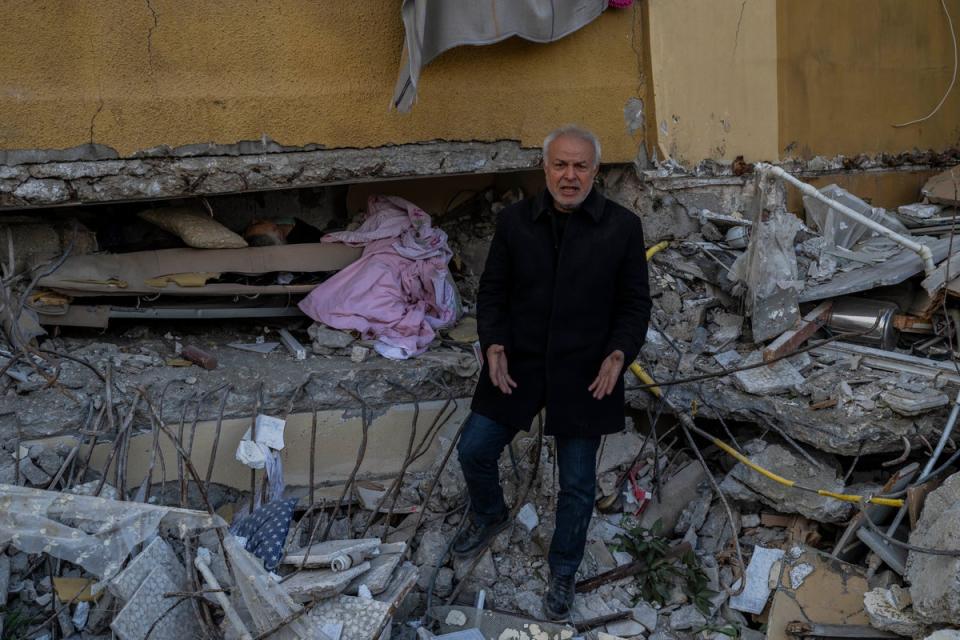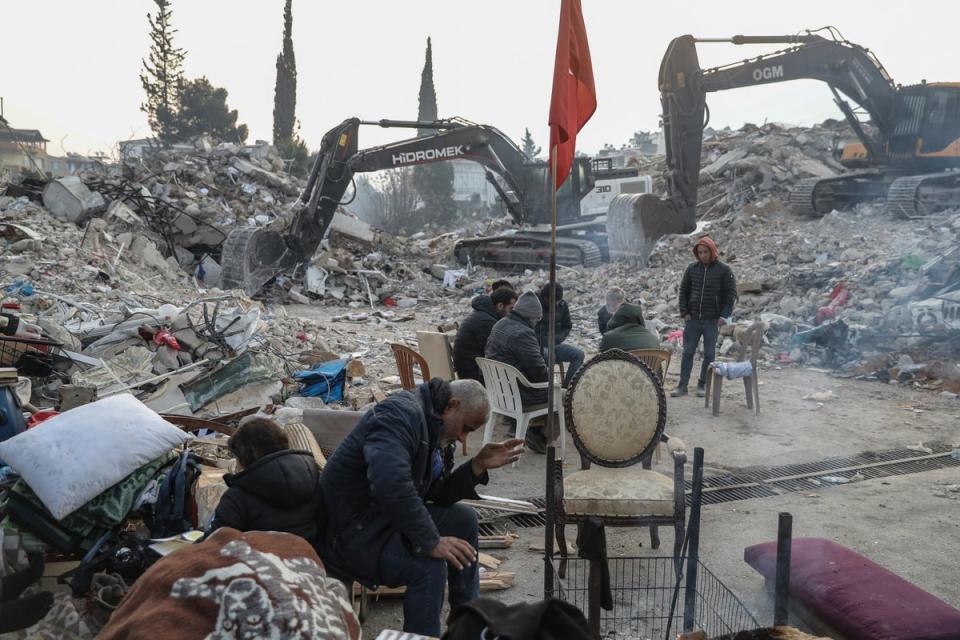Son recounts horror of watching mother die in Turkey rubble as they waited for help that never came
- Oops!Something went wrong.Please try again later.
A man who found his mother alive under the rubble after the earthquakes in Turkey has described how his relief turned to anguish and then anger as she died waiting for rescue teams that never came.
Zafer Mahmut Boncuk is among those whose grief at losing loved ones in the disaster, which has claimed more than 33,000 lives so far, is turning to fury over the government’s handling of the aftermath.
Mr Boncuk, 60, spoke to the Associated Press from outside the apartment block where his parents lived in Antakya. They were home when the earthquakes brought the building crashing down around them, and his father’s body is still lying under the rubble.
After the earthquakes struck last Monday 6 February, Mr Boncuk discovered his 75-year-old mother Ozcan Boncuk was still alive and that he could easily reach her through a gap in the rubble, but that she was pinned under the collapsed masonry.
She was able to talk, hold his hand and drink some water, and he promised her he would save her. Mr Boncuk spent hours frantically searching for someone to help get her out of the wreckage, but despite his pleas nobody came.
She died on Tuesday, the day after the earthquakes.
"I gave her water to drink, I cleared her face of rubble. I told her that I would save her. But I failed," said Mr Boncuk.
"The last time we spoke, I asked if I should help her drink some water. She said no, so I rubbed some water on her lips. Ten minutes later, she died."
He lashed out at Turkish president Recep Tayyip Erdogan, accusing him of "ignorance and lack of information and care”.
"What would happen if it was your own mother, dear Recep Tayyip Erdogan? What happened to being a world leader? Where are you? Where?" he screamed.
The body of his mother was only removed from the rubble on Sunday, nearly a week after she died.

The death toll from the 6 February earthquakes in Turkey and Syria has risen to 33,185. The toll is expected to rise further as search and rescue teams have been forced to prioritise buildings where they know people are still trapped alive.
With the survival window for having any chance of pulling people alive from the rubble closing, and reports of miraculous rescues becoming less and less frequent, attention is turning to anger over what critics call an uneven and ineffective government response.
Survivors have said more people could have been saved if the relief response had been more swift and effective.
People in the worst-hit Hatay province, near the Syrian border, said Mr Erdogan’s government was late in delivering assistance and that they suspect this was for both political and religious reasons.
Bediha Kanmaz, 60, whose son and grandson were found dead together with their bodies locked in an embrace, said her family were going through body bags to see if there are any more of their loved ones.
She and other residents blamed the slow rescue and search efforts on discrimination. The region has a large population of minority Alevis — an Anatolian Islamic community that differs from Sunni and Shia Islam and Alawites in Syria. Traditionally, few Alevis vote for Mr Erdogan’s ruling party.
Elif Busra Ozturk, whose two cousins were found in the rubble, waited outside the wreckage of the building where her uncle and aunt were trapped in Adiyaman town.

"For three days, I waited outside for help. No one came. There were so few rescue teams that they could only intervene in places they were sure there were people alive," she said.
Mr Erdogan said last week that disaster relief efforts were continuing in all 10 affected provinces but acknowledged shortcomings. He dismissed allegations of a lack of action from state institutions like the military as "lies, fake slander".
Officials said rescue efforts in Hatay were initially obstructed by the destruction of the local airport’s runway and bad road conditions.
The disaster has prompted Turkish authorities to take action against dozens of people involved in the construction of buildings that collapsed, and the justice minister has vowed to punish those responsible.
The United Nations on Sunday accepted there have been failures in sending aid to war-torn regions of Syria where supplies were going through Turkey.
"We have so far failed the people in northwest Syria. They rightly feel abandoned. Looking for international help that hasn’t arrived," the agency’s relief chief Martin Griffiths said.

